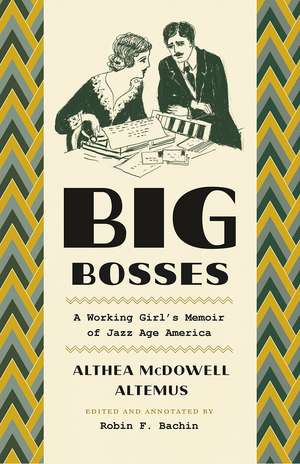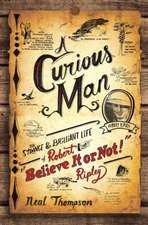Big Bosses: A Working Girl's Memoir of Jazz Age America
Autor Althea McDowell Altemus Editat de Robin F. Bachinen Limba Engleză Paperback – 18 noi 2016
Sharp, resourceful, and with a style all her own, Althea Altemus embodied the spirit of the independent working woman of the Jazz Age. In her memoir, Big Bosses, she vividly recounts her life as a secretary for prominent (but thinly disguised) employers in Chicago, Miami, and New York during the late teens and 1920s. Alongside her we rub elbows with movie stars, artists, and high-profile businessmen, and experience lavish estate parties that routinely defied the laws of Prohibition.
Beginning with her employment as a private secretary to James Deering of International Harvester, whom she describes as “probably the world’s oldest and wealthiest bachelor playboy,” Altemus tells us much about high society during the time, taking us inside Deering’s glamorous Miami estate, Vizcaya, an Italianate mansion worthy of Gatsby himself. Later, we meet her other notable employers, including Samuel Insull, president of Chicago Edison; New York banker S. W. Straus; and real estate developer Fred F. French. We cinch up our trenchcoats and head out sleuthing in Chicago, hired by the wife of a big boss to find out how he spends his evenings (with, it turns out, a mistress hidden in an apartment within his office, no less). Altemus was also a struggling single mother, a fact she had to keep secret from her employers, and she reveals the difficulties of being a working woman at the time through glimpses into women’s apartments, their friendships, and the dangers—sexual and otherwise—that she and others faced. Throughout, Altemus entertains with a tart and self-aware voice that combines the knowledge of an insider with the wit and clarity of someone on the fringe.
Anchored by extensive annotation and an afterword from historian Robin F. Bachin, which contextualizes Altemus’s narrative, Big Bosses provides a one-of-a-kind peek inside the excitement, extravagances, and the challenges of being a working woman roaring through the ’20s.
Beginning with her employment as a private secretary to James Deering of International Harvester, whom she describes as “probably the world’s oldest and wealthiest bachelor playboy,” Altemus tells us much about high society during the time, taking us inside Deering’s glamorous Miami estate, Vizcaya, an Italianate mansion worthy of Gatsby himself. Later, we meet her other notable employers, including Samuel Insull, president of Chicago Edison; New York banker S. W. Straus; and real estate developer Fred F. French. We cinch up our trenchcoats and head out sleuthing in Chicago, hired by the wife of a big boss to find out how he spends his evenings (with, it turns out, a mistress hidden in an apartment within his office, no less). Altemus was also a struggling single mother, a fact she had to keep secret from her employers, and she reveals the difficulties of being a working woman at the time through glimpses into women’s apartments, their friendships, and the dangers—sexual and otherwise—that she and others faced. Throughout, Altemus entertains with a tart and self-aware voice that combines the knowledge of an insider with the wit and clarity of someone on the fringe.
Anchored by extensive annotation and an afterword from historian Robin F. Bachin, which contextualizes Altemus’s narrative, Big Bosses provides a one-of-a-kind peek inside the excitement, extravagances, and the challenges of being a working woman roaring through the ’20s.
Preț: 106.52 lei
Nou
Puncte Express: 160
Preț estimativ în valută:
20.38€ • 21.34$ • 16.87£
20.38€ • 21.34$ • 16.87£
Carte disponibilă
Livrare economică 17-31 martie
Preluare comenzi: 021 569.72.76
Specificații
ISBN-13: 9780226423623
ISBN-10: 022642362X
Pagini: 192
Ilustrații: 29 halftones
Dimensiuni: 140 x 216 x 23 mm
Greutate: 0.34 kg
Ediția:1
Editura: University of Chicago Press
Colecția University of Chicago Press
ISBN-10: 022642362X
Pagini: 192
Ilustrații: 29 halftones
Dimensiuni: 140 x 216 x 23 mm
Greutate: 0.34 kg
Ediția:1
Editura: University of Chicago Press
Colecția University of Chicago Press
Notă biografică
Althea McDowell Altemus (1885–1965) was born into a family of factory workers in Woodstock, Illinois. She was married in 1910 and divorced in 1917, prompting her to work as a secretary in the years that followed. Robin F. Bachin is the Charlton W. Tebeau Associate Professor of History and assistant provost for civic and community engagement at the University of Miami. She is the author of Building the South Side: Urban Space and Civic Culture in Chicago, also published by the University of Chicago Press.
Cuprins
Foreword
By Joel M. Hoffman
Sample Pages from Althea Altemus’s Original Manuscript
A Note on the Transcription
Big Bosses
Afterword
By Robin F. Bachin
Acknowledgments
Notes
By Joel M. Hoffman
Sample Pages from Althea Altemus’s Original Manuscript
A Note on the Transcription
Big Bosses
Afterword
By Robin F. Bachin
Acknowledgments
Notes
Recenzii
“In her remarkable memoir, originally written under the pseudonym ‘A Private Secretary,’ Altemus recounts the wildest indiscretions of her employers between 1918 and 1925. . . . Altemus’ stories expose the challenges for young working women in the 1920s, when employers could fire secretaries for being married, a mother, or blonde. The annotations and afterword by historian Bachin provide context that enriches and clarifies the narrative.”
“Lively and enchanting. . . . Her tales [are] dishy, witty and a ton of fun. . . . It’s unclear what Altemus intended for this manuscript, which she wrote in 1932, but never released. What is clear is that, thanks to the efforts of her descendants, Hoffman, and Bachin, we are lucky now to have this remarkable—and remarkably written—document of everyday life and work in 20th century America from a perspective that is all too rarely seen.”
"Big Bosses shows the importance of female subcultures among women workers, the significance of personal bonds of female friendship. It shows how challenging it was for women to forge lives of their own in an era when the vote was newly secured but when other basic rights for women, such as credit and property ownership in their own names, would be contested for decades to come. . . . Big Bosses stands as a real contribution to our understanding of the history of working women in Jazz Age America."










